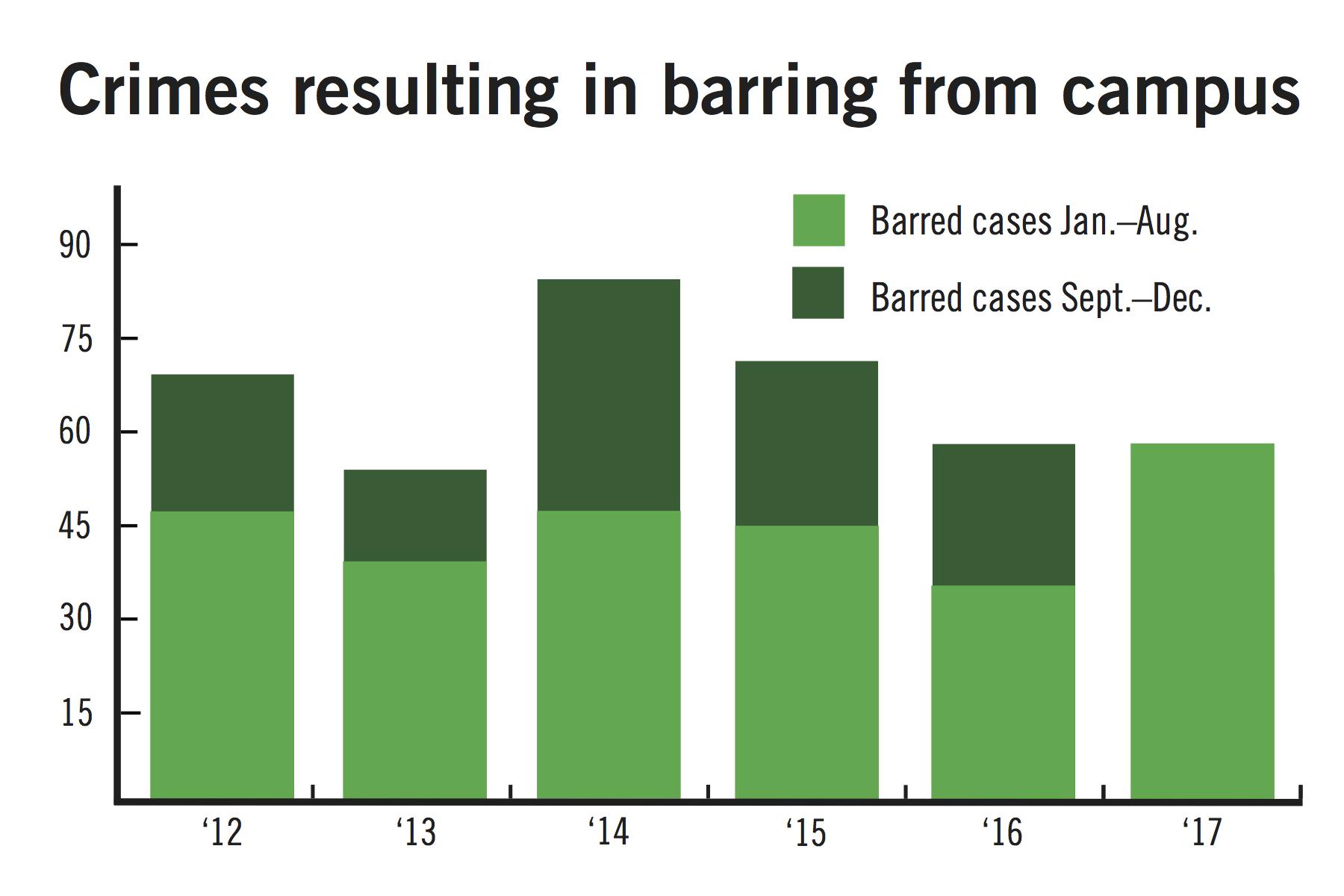The University has doled out more notices banning people from campus property in the first eight months of this year than any other year since at least 2012, according to GW’s crime log.

Olivia Dupree | Contributing Design Editor
Source: University Crime Log
While the overall number of barring notices had been decreasing since 2014, GW has already given out 68 notices banning individuals from campus property this year, compared to 58 in all of 2016, according to the crime log. Darrell Darnell, the senior associate vice president for safety and security, said GW’s urban location and the constant flow of outside visitors and office workers onto campus requires officials to regulate who is allowed on University property, but he said officials have not changed the guidelines surrounding when a person can be issued a barring notice.
The University can bar any non-affiliated person that it does not wish to have on campus for nearly any reason. Any person, affiliated or non-affiliated, can be banned from University property if they violate GW policies, according to the barring policy. The policy was last revised in March, according to the document.
Individuals who are issued a notice will be barred for a five-year period unless they appeal to the UPD chief, who can decide whether to rescind the notice.
Over the past four years, the average number of barring notices given out within the first eight months of the year sits at 43.
This year, 58 barring notices were documented through August. Ten cases have been reported so far this month, according to the crime log.
An open campus with public dining areas in some buildings attract many people who don’t have a direct connection to GW into campus spaces, Darnell said. Most people barred from campus are non-affiliated individuals entering buildings they do not belong in, he added.
“Because of this transient, urban environment, individuals not affiliated with GW may sometimes enter these eating areas and refuse to leave at closing or engage in activity that violates university, local or federal laws,” Darnell said in an email.
When people enter an off-limits building for the first time, GW – usually UPD – issues a barring notice. If they return, barred people can be arrested for unlawful entry, Darnell said. In the past year, most individuals arrested for unlawful entries were previously barred, he said.
Darnell declined to say why the number of barrings has increased through August this year, why the reported number would fluctuate from year to year, how often the notices are contested and how often they are rescinded.
The most common offense in the last five years that resulted in barring from GW is disorderly conduct, which makes up more than 33 percent of all barred cases over that span. Unlawful entries were the next most common reason for barring, making up 28 percent of all barred cases since 2012.
Between December 2016 and April 2017, two-thirds of the individuals arrested for unlawful entry had been previously barred.
Experts said the number of barrings may have increased because more individuals are entering campus or because of increased cooperation between the community and police to identify concerning individuals or behaviors on campus.
Being in a more densely populated area can lead to more non-affiliated people moving through campus, which increases the likelihood of someone committing an offense punishable by barring, S. Daniel Carter, a campus security consultant, said.
“If someone is merely disruptive, they would likely be asked to leave, but if they’re engaged with serious criminal activity as the underlying conduct, they would be much more likely to be arrested if they returned to campus, in my experience,” he said.
GW has banned more people from its property this year than its local peer schools have. As of Sept. 21, American University has barred 15 individuals from its property this year, according to the University’s crime log. Georgetown University had barred just one person through July, according to its crime log.
Most of GW’s peer schools do not have publicly available policies on how individuals can be barred from their campuses, except for expulsion cases or accusations of sexual misconduct.
Nearly 4,000 people had been barred from the University by 2010. Last month, a D.C. resident filed a lawsuit against GW and UPD for allegedly wrongly barring him from campus.
Jim Grayson, a senior security consultant at Summers Associates, said sometimes the area and climate around a school can change, sparking a higher perception of potential risk on campus and causing an increase in barring notices.
“In terms of urban campuses, one of the things that can change involves the climate around the school because whatever is going on right outside the borders of the school can spill onto campus,” he said.




